Star Wars 7 is a construction more than a film, made up of pieces from the other six films (mainly the original three and primarily A New Hope). It’s all homages and repeats. It’s well done, with every aspect meticulously crafted. We may have seen it all before, but the new paint looks good. The actors do better than under Lucas’s care, and so do the characters. It supplies exactly what the audience asked for. I don’t believe art involves supplying just what an audience asks for. That’s the job of hucksters and conmen. This is the finest movie you are likely to see that demonstrates the emptiness of the blockbuster business. It’s a bullseye on a low target. It’s hollow corporate fun. It would have never created a legend, but it can live off of one.
Last night I was updating my web site (Amazon changed how they do links—not that anyone takes them, but it took out all my pictures—will take forever to fix) and ended up reading my reviews of Jane Austin films. I compare all the Emmas and all the Pride and Prejudices. I loved watching those. Well, I loved watching some of those. A few versions of Pride and Prejudice are fine to skip, but the best are wonderful.
I remember curling up on the couch with Eugie for the Jennifer Ehle/Colin Firth version of P&P. Five hours or so—we sipped wine and it was kind of perfect. Austin is quite clever and there’s a good deal of romance, but even more romance watching it.
As I mention in my reviews, these are not films/series for a single guy to watch alone. These are date movies. Close to the perfect date movies. And it occurred to me I’ll never watch these again. There would be no joy to them. They would also be painful, but I can handle the pain far better than the lack of joy.
This is nothing new, just something else gone.

The top 3rd feels like two groups. About half would fit comfortably with the last section, while the best of the best here really soar. Maybe I should have split this into 5 or 6 posts.
Ten dominates the list, though if Nine had been in more episodes it would be a close call. Eleven shows up less, Twelve less still, and Thirteen is entirely missing.
#52 The Beast Below (S5-E2)
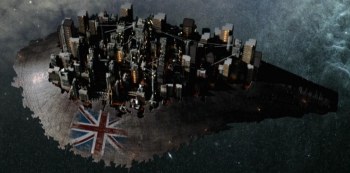 Eleven, Amy
Eleven, Amy
If I was ranking on costume design, this would be one of the best episodes. Amy isn’t given enough, but Liz 10 makes it worthwhile. Hmmm. A Liz 10 spin-off? Yes. The cop-out ending kills what could have been a top-notch story. And the metaphor… My god, you do not have to pound the metaphor so much. But it does do a nice job of showing why the Doctor needs a companion and how Amy will be a good one.
Doctor: OK. Companion: Good. Villain: Philosophy. Plot: cheap.
#51 The Girl Who Waited (S6-E10)
 Eleven, Amy, Rory
Eleven, Amy, Rory
Yet another very poorly built medical system—though this one has no excuse for it. Steven Moffat must have had a very bad time in a hospital. Lots of shades of grey and terrible choices. This ep is all about the emotions and wow, are there emotions. If you want to feel, this is the one to watch. I would have liked young Amy and Rory to be nicer to old Amy; that would have been more in their characters, but their anger and need and love all feels real.
Doctor: OK. Companions: Excellent. Villain: Unintentional. Plot: Good.
#50 Twice Upon a Time (S10-E13)
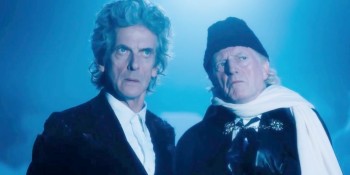 Twelve, One, Bill
Twelve, One, Bill
It leans more on nostalgia than I’d like, but new Who has rarely done it so well, and if that’s the plan, going back to the first Doctor is nice. There really isn’t a plot, although for a while the two Doctors think there is one. This is about two dying Doctors thinking about their past and if they want to go forward. The play between the two of them is good, and the nods toward your racist uncle are funny and relevant. It’s very sentimental, but then the Xmas eps usually are, and this one isn’t cloying. I wouldn’t have tossed Bill in (her ending has been mangled enough), but this is her best appearance since her first, so it worked out.
This ep is usually placed in season 11, but I’m putting it in season 10 as it has the season 10 Doctor, companion, writer, and showrunner, all of which would be changed with season 11.
Doctors: Very Good. Companion: Good. Villain: none. Plot: none.
#49 The Day of the Doctor (50th-Anniversary Special)
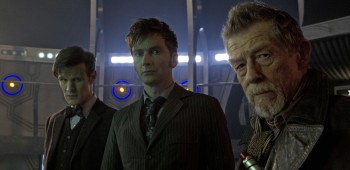 Ten, Eleven, War Doctor, Clara
Ten, Eleven, War Doctor, Clara
Disappointing.., and yet… You see, the lack of imagination is breathtaking; the greatest war in history, ranging over galaxies, fought by entities who are nearly gods, is basically a few guys with hand weapons. The low-rent, rubber-suit Zygons don’t help. The weakening of the basic structure is worse. On the other hand, The Doctors chatting to each other is a lot of fun and very emotional, and John Hurt was a welcome addition to his history, and that’s what counts. All they needed to do was put these three together and sit back. Saving Gallifrey wasn’t the important moment; it was the two Doctor’s realizing they had done the right thing, and they shouldn’t blame their one past self. This is a good special.
Doctors: Excellent. Companion: OK. Villain: Weak. Plot: Poor.
#48 Vincent and the Doctor (S5-E10)
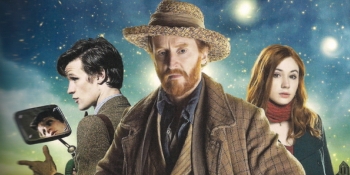 Eleven, Amy
Eleven, Amy
A good episode, but it gets far more credit than it deserves. It is not a deep exploration of depression, though it would like to be. There is way too much lightness and silliness for an episode that takes itself so seriously. Plus the music over Van Gogh’s visit to the library belongs in a different type of show–one that I don’t watch.
Eleven definitely isn’t the one for this. Ten would have pulled it off better. Amy, is of course, fantastic, and Vincent is well drawn.
Doctor: Wrong for the ep. Companion: Excellent. Villain: Weak. Plot: OK.
#47 The Doctor’s Daughter (S4-E6)
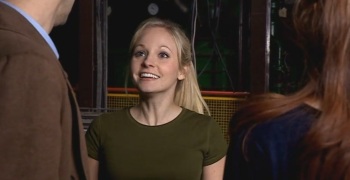 Ten, Donna, Martha
Ten, Donna, Martha
It gets a couple of points for its meta nature (David Tennant married the actress who played his daughter, who is in real life the daughter of Peter Davison, the 5th Doctor). The fish people are not the greatest creation, but more than made up for by Jenny as well as for the point about what it is to be a soldier. Budget limitations show up. This was an odd ep to bring back Martha as she’s stuck in a side plot that could have been cut.
Doctor: Good. Companions: Good. Villains: OK. Plot: Good.
#46 The Sontaran Stratagem / The Poison Sky (S4-E4/E5)
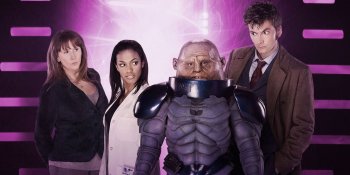 Ten, Donna, Martha
Ten, Donna, Martha
The return of the classic villain, the Sontarans—another SF warrior & honor race that is horrible at war. A solid episode, but while the previous one, Planet of the Ood, felt like it was a two-parter, this one felt like a single-part ep when seen from a distance. Not enough happens. The genius kid was unnecessary, as was Donna remembering her previous episodes.
Funny that Martha didn’t come into her own until after she was done with the TARDIS.
Doctor: Shrill. Companions: Good. Villains: Good. Plot: Good.
#45 Partners in Crime (S4-E1)
 Ten, Donna
Ten, Donna
This is a lightweight ep. A good re-introduction to Donna. She is 50% less annoying than as a bride, which still leaves a good deal. Some humor and a desire for adventure counter the annoyance. It leans a bit too far on the juvenile, however, the first meeting between The Doctor and Donna in this ep makes me give a pass to everything else.
Doctor: Excellent. Companion: Good. Villain: OK. Plot: Weak.
#44 Gridlock (S3-E3)
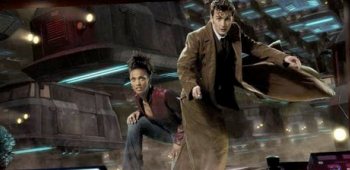 Ten, Martha
Ten, Martha
A surreal episode that works amazingly well for its unreal premise. The people of New New York get on a freeway and just stay on it, forever, moving only yards each day in the dense traffic. It’s also a “save the companion” episode. The many secondary characters are well-drawn and we get the return of a few old ones, giving Whoviens something to dwell on.
Doctor: Excellent. Companion: fair to good. Villain: None. Plot: Good, if slight.
#43 Hell Bent (S9-E12)
 Twelve, Clara
Twelve, Clara
Twelve goes crazy in an attempt to save Clara. I rather like that he flipped out. I wasn’t so fond of Gallifrey. The great civilization of the Time Lords has never been smaller. They could, and should, have done this ep without the Time Lord politics. It made them tiny and unimportant (well, not the first time that’s happened). Clara, however, got a good sendoff.
Doctor: Very Good. Companion: Very Good. Villain: Vague. Plot: Very Good.

Part 2 of ranking all the Doctor Who episodes (Top 3rd, Bottom 3), and the main thing to take away from the middle 3rd was how close together they all are. The bottom 3rd had far greater range with some terrible eps and some pretty good ones. These are all good, and I wouldn’t have a lot of trouble swapping them about in the rankings. Yes, 97 is not a winner the way 49 might be, but there is nothing here not worth watching once, or twice, or maybe more. I sound a bit grumpy with these, but only because I’d rather, in reviewing, focus on what should have been better than what is already excellent. The excellent has no need to improve.
The middle section is ruled by Matt Smith and Peter Capaldi.
#104 Can You Hear Me? (S12-E7)
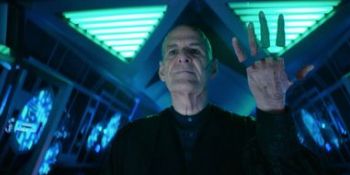 Thirteen, Ryan, Yaz, Graham
Thirteen, Ryan, Yaz, Graham
Gods, werewolves, and travel to ancient Syria. Well, this one is active. The personal problems of the companions are just plopped down and lay there. And the ending is both underwhelming and contains too many speeches, but it’s engaging while it is running at full speed, which is most of the time.
Doctor: Good. Companions: Active. Villains: Good. Plot: Fun.
#103 The Idiot’s Lantern (S2-E7)
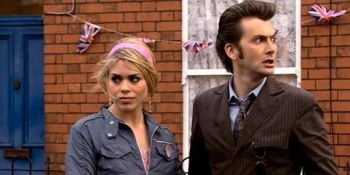 Ten, Rose
Ten, Rose
A weak, middle of the season ep. There usually is one, and at time of first broadcast, this was the weakest the show had been. Ah, those were the days. In general, this feels like the earlier, more juvenile version of Doctor Who. There is some satisfaction in seeing the fascist get his comeuppance, and both the political and television-related themes are solid (always amusing to see a TV show attacking TV). But the real joy here is in Ten and Rose interacting. At this point, the two of them together are fun no matter what they are doing, which is handy as they aren’t getting much help this time.
Doctor: Good. Companion: Missing too long. Villain: Weak. Plot: Weak.
#102 Night Terrors (S6-E9)
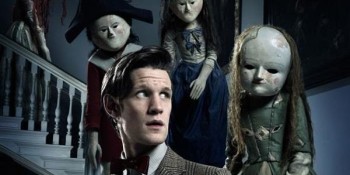 Eleven, Amy, Rory
Eleven, Amy, Rory
Another non-arc horror story about an alien child that’s not getting enough love. It seems to be a re-write of Fear Her, and I can’t think of any reason why you’d want to revisit that episode. The Doctor isn’t bad, and Amy and Rory are entertaining. Too bad they didn’t have a better story.
Doctor: OK. Companions: Good. Villain: Weak. Plot: Seen it before.
#101 The Girl Who Died (S9-E5)
 Twelve, Clara
Twelve, Clara
They had a story to tell and didn’t care about sense and character. So, the doctor comes up with an unlikely plan to lead a bunch of villages to defeat an alien invading warrior race. The plan wouldn’t have worked so well if a single alien actually fired his weapon. Or if they bombed the village from space after. But they didn’t for no reason. And villagers will run from overwhelming force, even if they are Vikings. A bit more thought into the script would have done wonders. Maisie Williams was a nice guest star, even if the season ended up doing far less with her than they implied they would.
Doctor: Good. Companion: Dim. Villain: Really dim. Plot: OK if unlikely.
#100 The Rings of Akhaten (S7-E7)
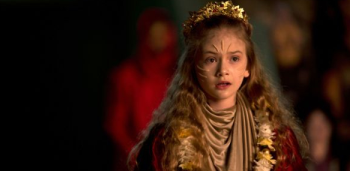 Eleven, Clara
Eleven, Clara
The main things this ep establishes is that Clara is going to remain weaker and less fun than her two earlier incarnations. Bad space scooter FX, and the music gets cloying. Not surprising when, once again, love saves the day.
Doctor: OK. Companion: OK. Villain: OK. Plot: OK.
#99 Nightmare in Silver (S7-E12)
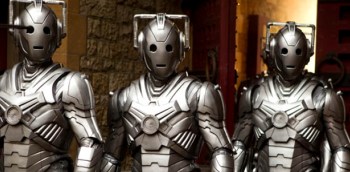 Eleven, Clara, Annoying children
Eleven, Clara, Annoying children
Gaiman’s a good writer, but you wouldn’t know it from this, although if he was assigned the plot of children at an amusement park and the Doctor fighting himself, there isn’t much he could have done. Why would you write this and not kill the children? Clara doesn’t bring much, but she’s more amusing than the Doctor. The only time Clara worked with children was in The Snowmen, but they just kept trying, and failing.
Doctor: Weak. Companion: Weak. Villains: Weak. Plot: Middling.
#98 Oxygen (S10-E5)
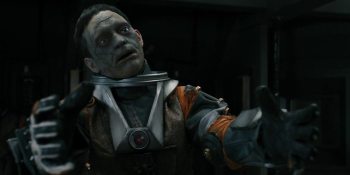 Twelve, Bill, Nardole
Twelve, Bill, Nardole
One of the “a few people stuck on a spaceship about to die” eps that Doctor Who loves so much. This is weaker than a majority of the others but is strong for season 10 with an emphasis on theme. The look at capitalism is solid.
Doctor: Good. Companion: Good enough. Villain: Good. Plot: Good.

We are squarely in Doctor Who season again (yes, that’s an official season of the year), which has not only focused my interest but focused the interest of others who then foolishly ranked all of the episodes. The problem with their rankings was that they were wrong–wrong in that they were not my rankngs. Yes, sometimes it is that simple. So it seemed necessary for me to rank them. This I have done, from worst to best, in three posts (and I’ve updated this list now many times as new episodes came out). In general, I grouped multipart episodes together.
Naturally, I didn’t go at this as a blank slate since that would make it meaningless. Rather, I have a few positions that greatly determine my rankings. Those are:
- Writing is the most important.
- I’m good with Doctor Who being a family show–not so much with it being a kids show. If things get too silly or are directed only at children, my ratings go down.
- I don’t expect the science to be good, but I do grade down when things completely lose internal consistency or when an episode takes pains to point out something egregiously stupid.
- The season arcs matter. A bad arc hurts more than a good arc helps.
- Yes, I think some Doctors were better than others. This is mainly due to versatility of the actor and versatility of the role, plus charisma.
- Yes, I like some companions better than others. Some never worked (the “Fam”). Some should have worked but never jelled (Martha). Some started poorly but improved (Mickey, Donna). Some started great and fell apart (Clara). Some were perfect (Rose, Amy, Captain Jack). Some were great in so many ways, though scripts or arcs let them down (River). I universally hate all mothers on the show (I think someone had mother-in-law issues).
- I started watching Doctor Who in 1978 and picked up the earlier ones later. I’ve watched every existent episode, many of them multiple times. That makes me an old-time Doctor Who watcher. However, I do not have some of the qualities attributed to those earlier fans. I do not give a pass to horrible FX. I do not give points for the show merely referring to its past. And most importantly, I am not against romance and sexuality. (Original Who was famously asexual. People forget that the biggest outcry against the 1996 movie was not the half-human line, but rather that The Doctor kissed a woman.)
For the most part, the modern Doctor Who has been very good, though the bottom quarter is skippable and contains a few stinkers. So, let’s start with the one that smells the worst. Luckily, it gets better. (And yes, I might seem a bit harsh here, but it is the bottom 3rd.) This section is ruled by Twelve and Thirteen, who have between treen and four times the eps in it as Ten and Eleven combined (Nine is never in this section).
#156 Kill the Moon (S8-E7)
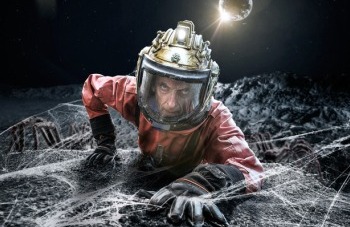 Twelve, Clara
Twelve, Clara
The most ill-prepared and dimwitted astronauts in history head to the moon to blow it up and Twelve, Clara, and one of her students (yes, a student) tag along. The moon is an egg for a giant alien and it is gaining mass (because that makes sense). None of the characters come out of this one looking good, but that doesn’t matter when the central point is this stupid. The only positive is that there is very little Clara and Danny faux-romance. Use this episode to argue over which character, The Doctor, Clara, the teenager, or the dim astronaut is the most annoying. If you watch Doctor Who and ask, “Oh, why can’t there be more pointless arguments?” this is your episode.
Doctor: Annoying. Companion: Annoying. Villain: Missing. Plot: Deeply stupid.
#155 Legend of the Sea Devils (Special)
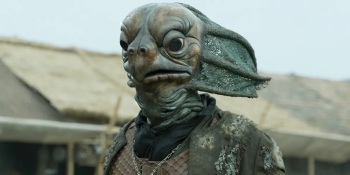 Thirteen, Yaz, Dan
Thirteen, Yaz, Dan
It’s hard to think of anything good to say: The Sea Devils look “better” than they did in their last appearance in the ‘80s and there’s an OK Stephen King joke. That’s it. The rest is junk. The fights are unlikely, the characters ridiculous, the tone is bleak for no reason, the relationship material is annoying, and the ending is a meaningless lightshow. And wow, Chibnall does not understand what the Earth’s magnetic field is.
Additionally, the editing is horrendous with the same shot being used multiple times (sometimes reversed), and establishing and transition shots missing. Apparently this was due to COVID lockdown, which is an explanation, but doesn’t make it better.
Doctor: Lame. Companions: Idiots. Villain: Weak. Plot: Pointlessly complex.
#154 In the Forest of the Night (S8-E10)
 Twelve, Clara
Twelve, Clara
So who thought it was a good idea to stick a group of school children with the Doctor and have Clara stuck in teacher mode? I suppose it was an attempt to pull in the kid audience, or maybe it was just stupid. The kid-filler was needed as the plot should only have filled about fifteen minutes. It isn’t a bad plot; there just isn’t much to it as there is no adversary or actual problem. So a brief story about intelligent foliage, a fair amount of wasted time, and plenty of bad character development. I didn’t think Danny could be any less interesting. The family ending is saccharine and comes out of nowhere and is just another piece of wrongness.
Doctor: Weak. Companion: Weaker. Villain: None. Plot: OK, but brief.
#153 The Battle of Ranskoor Av Kolos (S11-E10)
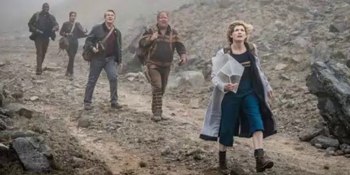 Thirteen, Ryan, Yaz, Graham
Thirteen, Ryan, Yaz, Graham
The problem with big eps that are supposed to prove a point is that sometimes they prove the opposite. This one plays down all the death and pain so as to claim that killing the big bad wasn’t and isn’t the best idea, but it clearly was and still is. And that big bad ends up being strangely wimpy.
Doctor: Weaker. Companions: Eh. Villain: Wimpy. Plot: Underwritten.
#152 Flux (S13-E1 to E6)
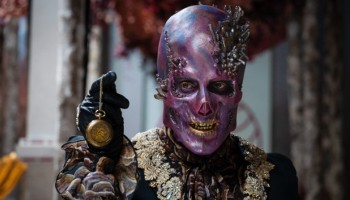 Thirteen, Yaz, Ben
Thirteen, Yaz, Ben
Since two of the six parts of Flux can’t stand on their own, I’m counting it as a single episode, and as that, it doesn’t work. You have to stick the landing, and Flux falls on its face. Too much time is spend on things that don’t matter with the main plot being given far too little time. Characters are undeveloped, motivations are vague or missing, and nothing matters. Yaz finally seems like a character, but she still doesn’t do anything that counts. Major questions are left unanswered and unexplored whereas things of no consequence are explained in detail.
Doctor: OK. Companions: A bit better. Villain: Vague. Plot: Nonsense.
I’ve seen multiple rankings of all the Doctor Who episodes (or just all the modern ones) recently, and they all have been horribly wrong. I know this because they don’t match mine, and mine are correct. That’s just the way the universe is. Obviously I will have to fix this.
OK, if I’m going to rank all the modern Doctor Who episodes, let’s start with the minisodes. And there are a lot of them, and many of them are hardly stories. With that in mind, I’ll skip anything that was intended as an intro or break for a film, musical production, or non-Who TV show, or anything which is a game or part of a game show. I’ll also skip cut scenes (like Born Again) or episode prequels (there are a lot of them). Few of them are required viewing in any case (only the two Lady Vastra ones that act as prequels to The Snowmen really need to be searched for). Though in some cases, the “minisode” prequel is a bit more, in which case I’ve included it.
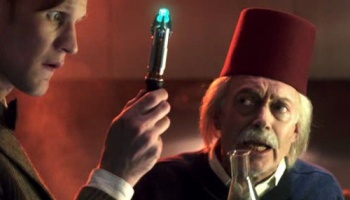 #17
#17
Death is the Only Answer
The Doctor meets Albert Einstein in the TARDIS. Written by school children who won a competition. Well, hard to say mean things about something written by children.
#16
Good as Gold
Another episode written by children. Eleven and Amy want to go on an adventure and instead end up saving the spirit of the Olympics. Yes, it is exactly what it sounds like it would be. Again, don’t want to say mean things about something written by children.
It’s been one year since Eugie died. I knew it was going to happen that day, September 27, 2014. I decided it. The machines could have kept her going for longer—indefinitely I suppose. But there was no point. Her lungs were gone and cancer patients don’t get new ones. There was no point to waiting. Weeks earlier, when she was still able to fully wake, she’d told me, as best she could, that her dreams were now nightmares. She didn’t need any more nightmares.
I woke her. The doctors were not so keen on that, and had a lot of very good reasons not to do it. But I knew my wife. So I woke her. There is some question to how awake she was. She’d been drugged so very deeply, to keep her stats even so that those machines could keep her alive, and to keep away those nightmares. I’ll never know how successful they were at the second. The best I could expect on her waking was for her to be able to blink. I have my own reasons, which I will keep to myself, to believe that she did manage that. But she managed nothing more.
And then I let her go.
And a year passed.
Funny, I thought it would be such a slow year, a torturously slow year. But it has been fast. Faster than I could have imagined. Faster by far than any other year. For me, maybe a month has passed. I can’t really say. Timey wimey. There is nothing to mark the passage of time. The landmarks of life have to be important. They can be terrible or wonderful but they have to matter. And without Eugie, nothing matters. Nothing is important. So time passes without pause, without remembrance, without mattering.
Oh, there are little moments of semi-importance: her memorial; being able to talk about her at the Nebulas, and having Ursula saying Eugie should have won—thank you for that Ursula; getting together at Dragon Con in remembrance of her and picking up her fandom award. Those are as important as life is, and they are not important enough to mark the days, not without being able to tell her about them.
I don’t mind time going quickly. It isn’t something to like or dislike. It just is. Continue reading »
Fans did their best to keep the second or so most prestigious science fiction award, the Hugos, from tail spinning into the mud (I like the Nebulas, and the Sturgeon awards more). When the winners were revealed, no reactionary puppies won—Guardians of the Galaxy did win for Dramatic Presentation, Long Form, but everyone agrees the pups shouldn’t be held against it. Five No Awards: for Short Story, Novella, Related Work, and both editor categories.
My predictions went pretty well, with twelve right. I missed on Fan Artist, Dramatic Presentation—Short Form, Editor-Long, Editor-Short, and Short Story. With the exception of Artist, where I knew nothing and just followed GRRM (damn you George RR Martin!) my misses all came from my mistaking the 2400 new voters (and many of the older ones). I saw things through my eyes, so I pictured Pups, Anti-pups, and Fandom-Defenders. These groups all have clear philosophies. The members wouldn’t be dwelling on what others did but rather vote motivated by their own philosophy. Pups would vote for pups, going for the most obnoxiously pure. And they did. Anti-pups, realizing the Hugos were a sham this year, and there was nothing to celebrate, would vote as much as possible to forget this year so we could move on to the next without the taint. I’m one of those folks. And Fandom Defenders would come to celebrate fandom, voting for all equally, though perhaps holding a grudge against a few of the most egregious pup nominations. That’s the Martin/Scalzi approach.
I forget people aren’t like that. They don’t all function with a philosophy. That’s probably for the best as philosophies make people dangerous (watch Videodrome). A majority of the fans fit in between my Anti-Pups and Fandom Defenders. They were “What the Hell! Those guys are dicks!” voters. They came to celebrate fandom, but also, to point at the dicks, and then give them the finger—just as those dicks, the puppies, had been giving fandom for the past three years. They came to the party, laughing and dancing and having fun, saw the party-asshole, sprouting his politics and claiming he was the victim, and yelling it loud enough to be heard over the music, and they said, “Screw that guy.” Continue reading »
When I started writing this I was going to name it “Handicapping the Hugos,” but then I saw that some unknown writer, who also swiped my idea for a book series focusing on a coming season (mine was Spring is Coming. Think that would sell?) had done his own handicapping, and with that title. So, a re-title, a bit of a re-write to go in his order if you want to compare, and away we go. (If you don’t like the whys, skip down 5 paragraphs)
The Hugos are usually hard to call, and this year the unknowns are too high. Those unknowns are the large number of new voters. There’s over 2000 more votes than last year. The winners will be determined by who those 2000+ are. One possibility is that they are “unaligned,” coming into the Hugos due to the added publicity, but not having any political views. I find that incredibly unlikely. I’ll give it a 1%. I think these new voters fall into one of three categories.
Puppy Supporters – And extreme ones. No one jumped into this because they have a mild interest in upsetting the apple cart. No, if they’re pups, they’re frothy, and will be voting for the party. Their only problem is since most of the candidates are from the party, sometimes their voting strength will be defuse. But in a few categories, a small number of people could rule. Chances are they haven’t read many of the works.
Anti-Pups – That’s me. The goal is to stop the pups from destroying the Hugos in the long term, knowing that this year is already a lost cause. The racism and sexism, not to mention the reactionary philosophy of the pups are what brought in these voters. They’ll use “No Award” often, and tend to vote against any pup. There will be some cross-overs (in dramatic presentation categories, and where the nominees made it clear they want nothing to do with the slate that got them there), but for the most part, slate candidates will get nothing from these folks.
Fandom Defenders – These are the folks who want to pretend that if we just act as we always have (except to vote this year) things will be OK and people will be happy. These people will be operating with the philosophy that each work should be considered on merit alone, so will cross over as they see fit. However, they will see the pups as attacking fandom, so they will be suspicious of pups, and no matter their general philosophy, they won’t vote for Vox Day or John C. Wright. If they are more informed, you can add Tom Kratman to that list. Chances are they’ve haven’t read all the works. Continue reading »
Max, looking younger than last time we saw him (Tom Hardy taking over for Mel Gibson), is taken captive by a flamboyant cult, lead by the unimpressive named Joe and filled with worshiping, sickly, pale, “war boys.” Coincidently, Imperator Furiosa (Charlize Theron) chooses this time to betray the evil leader and sneak away his wives in an armored fuel truck. Fanatic war boy Nux (Nicholas Hoult) takes off in pursuit, bringing Max as a source of transfusions. Max can’t stay a prisoner for long, and once free, teams up with Furiosa to fight off the cult’s diseased warriors and souped-up vehicles in a two-hour road chase.
Writer/Director George Miller returns to the series that made his career, and sticks exclamation points everywhere. Fury Road is bigger, louder, faster, more violent (if less gritty), and more beautiful than Mad Max has been before. This is The Road Warrior, turned up to 11, and then turned up some more. It is an epic, telling a mythic tale in a mythic fashion. And except for a few moments of stylized emoting (Furiosa dropping to her knees to cry out her misery), it is non-stop action. The story feels like it is ten thousand years old (and it might be) and everything is so grand that it left me thinking this should be a story of ancient gods, not mortals.
Sound pretty good? Well…it is…pretty good. But it’s not great. Two hours at 11 is a long time, and that epic story telling starts looking like a pile of clichés pretty quickly. That’s the thing about myth—we’ve seen it all before and it seems silly if examined too closely.
Fury Road is a film that suffers from its overstated reviews. It quickly gained a reputation as the best science fiction movie of recent years (it’s not), and certainly of this year (it’s not). As action done perfectly (nope). And, as meaningful feminist filmmaking (not at all). It’s a fun film, but lowering expectations is in order.
The non-stop action gets tiring, particularly as these scenes have been done before by Miller himself. It is a retread of the last third of The Road Warrior. When Mad Max Beyond Thunderdome came out, it was attacked by critics and the public for its climax being a repeat of the chase from the previous film. It is hard for me to figure why Fury Road is getting a pass on that when the entire film is a repeat. Perhaps the first three films are old enough that current audiences haven’t seen them—if so, that’s quite sad. The car chase, with its accompanying gun fire, circus acts, flaming electric guitar (yup, there’s one of those), giant drums, and constant explosions is done very well. Except for film speed changes (which was all the rage in 1926), I couldn’t ask for better. I could ask for some time between combats so that I could get to know the characters and what is at stake when generic evil dude pops up with a chinsaw. The villains were just Bad Guy #1, Bad Guy #2, Bad Guy #3. It’s pretty, but empty.
Character development suffers even in the few moments of non-fighting. Max barely speaks. He gets some PTSD visions, and that’s all the personality he has. Feriosa is the tough chick. That’s it. The most clearly defined character is the dying war boy, and that’s only because he has more than one character trait. This is part and parcel with larger-than-life storytelling, along with the actors either playing for the back rows (the earlier mentioned knee dropping despair) or not acting at all (Hardy seems to be on substantial mood suppressants). But Star Wars managed it, with its thinly clothed icons having some personality.
There isn’t much plot, but what’s there is drivel. Coincidences and really, really bad plans are what we’ve got. The story is just an excuse for machines with wheels to run into other machines with wheels, so its weakness is only a minor detriment. The world itself makes no sense, which again, is part of the whole mythic thing, but films need a bit more foundation than epic poems, at least films shot semi-realistically. The world has lost absolutely everything, except for replacement fuel injectors and gasoline. The Road Warrior was unlikely in its depiction of a gas-low world where everyone was constantly using tons of petrol. Fury Road is just nuts. I’d have never guessed how abundant chrome would be in the new world.
Much has been made of Fury Road being a feminist masterpiece. This was primarily started by a men’s rights advocate (and he didn’t use the world “masterpiece”) writing a paranoid review from seeing the trailer. Apparently having a strong female character was too much to bare, and others picked up the line. But like most things coming from men’s rights groups, it is misguided. The biggest failing in that narrative is that this is a Mad Max movie. It shouldn’t be. It should be Furiosa of the Future, as she is the protagonist. We should have started with her, learned more about her, gotten into her head. Furiosa, a female bad-ass, steals evil Joe’s harem girls. The only male needed in that story was the war boy Nux. But no one trusts a female-lead action film, so we have Max. It’s Max we start with. It’s Max we follow. He is in every way unnecessary, but yet, there he is. In a movie that, from the story, should be all about women, the lead is an inserted male. Unless you consider The Last Samurai an Asian rights film, Fury Road is no feminist movie.
For those of us who have seen the earlier entries, continuity is an issue. When is Fury Road supposed to take place? Online speculators suggested that this was a new Max, but Miller said otherwise. Since he still has his car, that places it before The Road Warrior, but that doesn’t work on many fronts. And age is an issue. Max had a family before the fall of civilization, and a job as a cop, placing the apocalypse no more than twenty years ago. Furiosa, who seems about Max’s age (and played by an actress two years older) was either a small child or not yet born when the collapse happened. Huh. Perhaps Miller should have hired Gibson again. At least an old-man-Max would have made sense. And who is the little girl in Max’s PTSD visions? The death of his wife and child no longer bother him, but the loss of some unknown girl does.
Fury Road is a fun, mindless, explosion-filled extravaganza, that would be more fun with a few less explosions. It is silly, inconsistent, and as socially relevant as a Transformers movie. Ask for little, and don’t worry about getting up in the middle for popcorn, and you’ll probably have a good time.
I place it third of the four Mad Max films, after its two immediate predecessors.
It follows Mad Max (1979), Mad Max 2: The Road Warrior (1981), and Mad Max Beyond Thunderdome (1985).
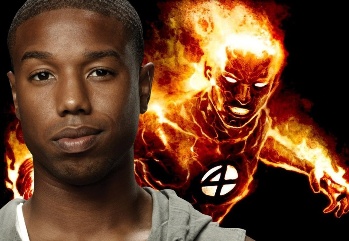 Let’s just start with the premise: “Heritage” is never the answer to anything. It is never a reason to do anything, or like anything. Heritage is a description of history. It is now your job to determine if the events of that history are good, or bad, or simply irrelevant, and act accordingly.
Let’s just start with the premise: “Heritage” is never the answer to anything. It is never a reason to do anything, or like anything. Heritage is a description of history. It is now your job to determine if the events of that history are good, or bad, or simply irrelevant, and act accordingly.
Recently, heritage has come up as a defense for the Confederate flag still flying over government buildings, or flying over a home. That the flag is a symbol of racism, that it was originally used as an icon for an army formed, and then fighting, to retain slaves, and that it was pulled out of mothballs by racist groups, and by racist legislators long after the Civil War as a way to protest civil rights is a matter of history. Or, if you will, that is its heritage. When someone says the flag is a symbol of heritage, that is the heritage of which they speak. I’m not going to argue that any more because chances are if you are reading my blog, you already know that and believe it.
Which brings us to heritage in geekdom. Just like for racist Southerners (and some Northerners), heritage is used in the geek community as an excuse for all kinds of sins. It is also used mindlessly. As I need a distinction, I divide those in the community into “fans” and “fan-boys.” (And yes, you can have a female fan-boy). Fans are people who like a work. Fan-boys are those who no longer care if something is good, or great, or even if it is horrible, as long as it is pure, and supports their egos. Fan-boys are ego connected to the things they clutch close to their breasts. They take their identity from those things. To Star Wars fan-boys, an insult to Star Wars is an insult to themselves. Someone laughing a Batman is laughing at them (the Batman fan-boy). It’s why they can’t stand camp. Continue reading »
Super scientist and ex-Ant-Man, Hank Pym, recruits down-on-his-luck cat burglar Scott Lang (Paul Rudd) to become the new Ant-Man. Hank’s ex-protégé and stereotypically evil businessman, Darren Cross, is about to rediscover Pym’s shrinking technology and sell it to terrorists, and Hank needs a new Ant-Man to stop the evil plan and destroy all records of the technology. And Hank’s daughter, Hope van Dyne (Evangeline Lilly), she…she…um…well, she’s there too.
The least of the Marvel Cinematic Universe* movies is a good time, which is handy, as Ant-Man is a lesser one. It’s fun, with a few laughs and plenty of wiz-bang superhero combat moments. You’ll enjoy it at a matinee with some friends and a large tub of popcorn. I enjoyed it, just not as much as the other MCU films, and any time I thought about anything in the film, I enjoyed it a little less. Still, it’s a thumbs up, if not enthusiastically.
Oddly, they get right the most difficult bit, the concept: a shrinking man with ant friends. If Thor and Iron Man were B-listers in the Marvel comic universe (before their star-making films), Ant-Man is a D-lister. Shrinking is not an exciting power (hmmm, I could have mighty strength, control lightning, and have a miraculous hammer, or I can squeeze through an old-timey keyhole… which would I choose?) and having insect buddies is best suited to a child’s cartoon. But Ant-Man manages to make the concept of shrinking both powerful and frightening. It is believable that Pym particles, which can compress the distance between atoms) could tear apart civilization. And ants make useful and fun sidekicks without being embarrassing. It is the concept of Ant-Man that was the problem the filmmakers had to solve. Once they beat that, and they did, the rest should have been easy.
But it wasn’t. Plot and character are beyond these filmmakers. The actors do their best. Paul Rudd is likable and a nice addition to the Avengers star roster, but he’s more along the lines of Anthony Mackie (Falcon) or Jeremy Renner (Hawkeye) then a Robert Downey Jr. (Iron Man) or Tom Hiddleston (Loki). That is, he’s fine, but he doesn’t shine brightly enough to blind you to the flaws all around him. Michael Douglas does a bit better, bringing much needed weight (with still a sparkle in his eye), but he’s not given enough screen time to make his conflicted character really work. (Hey, Marvel—lost opportunity: you could have had Pym cameos in two or three earlier films so there was something existent to work with). As for Evangeline Lilly, she’s just wondering what she’s doing in the film, and why her wig-maker punked her.
Part of the problem is the sameness of it all. If Ant-Man came out before the recent wave of superhero films, it might feel less of a retread, though maybe it’d have to be moved to a time before light heist films, so, perhaps 1929. Lang is your generic criminal with a heart. His daughter is rolled out, dusted in saccharine, as his motivation. It’s not earned, it’s just dumped there. Scott gets his chance at redemption with the help of an aging mentor, and slips into a training montage. It all builds to a climax I could have predicted in 1985. The romance with Hope is shoehorned in because adventure-heist films have traditionally had a romance. It doesn’t matter that it doesn’t fit. It’s part of the by-the-numbers script. Then there is the villain, Obadiah Stane. No, that’s the evil industrialist working with terrorists from IronMan. I mean Justin Hammer. No, that’s the evil industrialist working with a terrorist in Iron Man 2. I mean Aldrich Killian. Nope, that’s the evil industrialist working with terrorists from Iron Man 3. Well, you get the point.
But “I’ve seen it all before” isn’t the biggest problem. The problem, the huge, tidal-wave of swamp water sweeping away your brain, is the characters’ plans. On no level does anyone do anything that makes any sense. These are the stupidest plans I can recall in cinema (OK, there’s probably worse out there, but at the moment, I can’t recall them). There’s been a lot of dim plans in the MCU films, but they were either justified by severe psychological problems (Age of Ultron) or buried in a constant barrage of action and explosions (The Winter Soldier). But in Ant-Man, the plans are the plot. We have no choice put to focus on the plans as that’s what the characters are focusing on. And what are these plans? Cross’s plan is to develop the tech to shrink a human, because until then, he’s got nothing to sell his warmonger business partners. Really? He can shrink anything. Anything. Bombs. Buildings. Walls. He can also shrink people, they just end up being tiny blobs of meat. He has a perfect assassin’s weapon. And he can’t sell that? Any of that? Terrorists couldn’t use that for something? Huh. No, he needs the people shrinking part. Then there’s his concept of holding a meeting with those terrorists, and inviting all the people out to stop him.
But forget him. Let’s look at Hank. He needs a new Ant-Man. I’ll just skim over the bizarre lengths he goes to in order to get a thief, instead of anyone with combat skills. The obvious choice–the smack you over the head, stop the movie dead, scream in your face choice–is his daughter. The film knows this, so sticks in a reason Hank won’t choose her, a reason that just makes the flaw more visible and makes it clear this should have been The Wasp, not Ant-Man, but no one was ready to trust a superhero film to a female lead. There was a load a ridiculous complaints about Age of Ulton being anti-feminist. It wasn’t, and it is annoying that a small group of silly people wanted to yelp about that when they only had to wait a few months for this shining example. Ant-Man has a huge glowing arrow pointed at Hope the entire time, with the words “See, that’s a woman, and we’re not using her because she’s a woman.”
OK, so I’ll just sigh and accept he chose Lang. Should I also just ignore that they could have carried out all their plans in safety any time over the last ten years, without an Ant-Man. Hope has keys. She can just walk in and plant a miniature bomb which can be expanded by an ant as she leaves, and we’re all done. And Hank doesn’t use an ordinary bomb, but a shrinking bomb, which blows up big time and then sucks everything away. Cool. It’s very effective. In which case, forget about keys. Just toss the bomb on the lawn by the Pym Tech building and we’re all done. Well, except for all the people that bomb would murder but…oh, they did that anyway. Poor office workers.
OK, so I’ll sigh and accept that Hank and Hope have major procrastination issues, and bad pitching arms, so need Lang. Great. So the plan, without covering their tracks (they’re all going to jail when this is over), is to sneak in and short-out the servers and then blow up Cross’s tech and records. Right. So, no off-site backups? OK. And why do you short out servers before blowing them up or swipe a suit before blowing up everything? But lets let all that go and consider that they never talk about murdering Cross. He’s the one who re-developed the tech. So wouldn’t he just go make it again? I’m pretty sure that if an early Apple manufacturing plant burnt down, Steve Jobs would not have instantly forgotten what computers are.
These planning problems might not seem a big deal for those of you thinking, “I just want to see some cool fights and big booms.” But that’s Captain America. Ant-Man dwells on these ludicrous plans. The characters discuss them. The film is structured around them. You can’t ignore the stupidity.
All that does make the film sound pretty awful. It’s not. But wow, it could have been—should have been—better. Try not to think. Try not to dwell on what Hope’s purpose is or why anyone is doing what they are doing. Watch the cool shrink-grow-shrink-punch-grow battles. Smile at the three clown human sidekicks who exist only for comedy. Laugh at the train (there’s a good train gag). And eat that popcorn.
At least it isn’t dark and whiny.
For MCU geeks, Ant-Man is the least tied-in movie to date. A few Avengers references are made, Falcon pops up, and Peggy Carter and Howard Stark appear briefly, but the over-arching arc is ignored. There are no infinity stone MacGuffins and Nick Fury doesn’t show up to discuss The Avengers Protocol. The second after-credits sequence (yup, there are two of them) points toward Captain America: Civil War, but it looks like you could skip Ant-Man and not feel you’ve missed anything in the ongoing saga.


